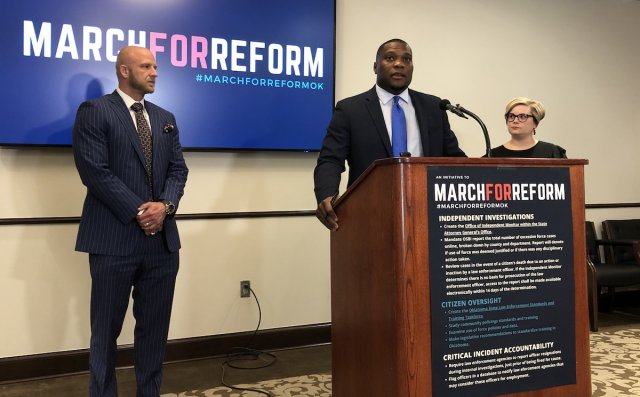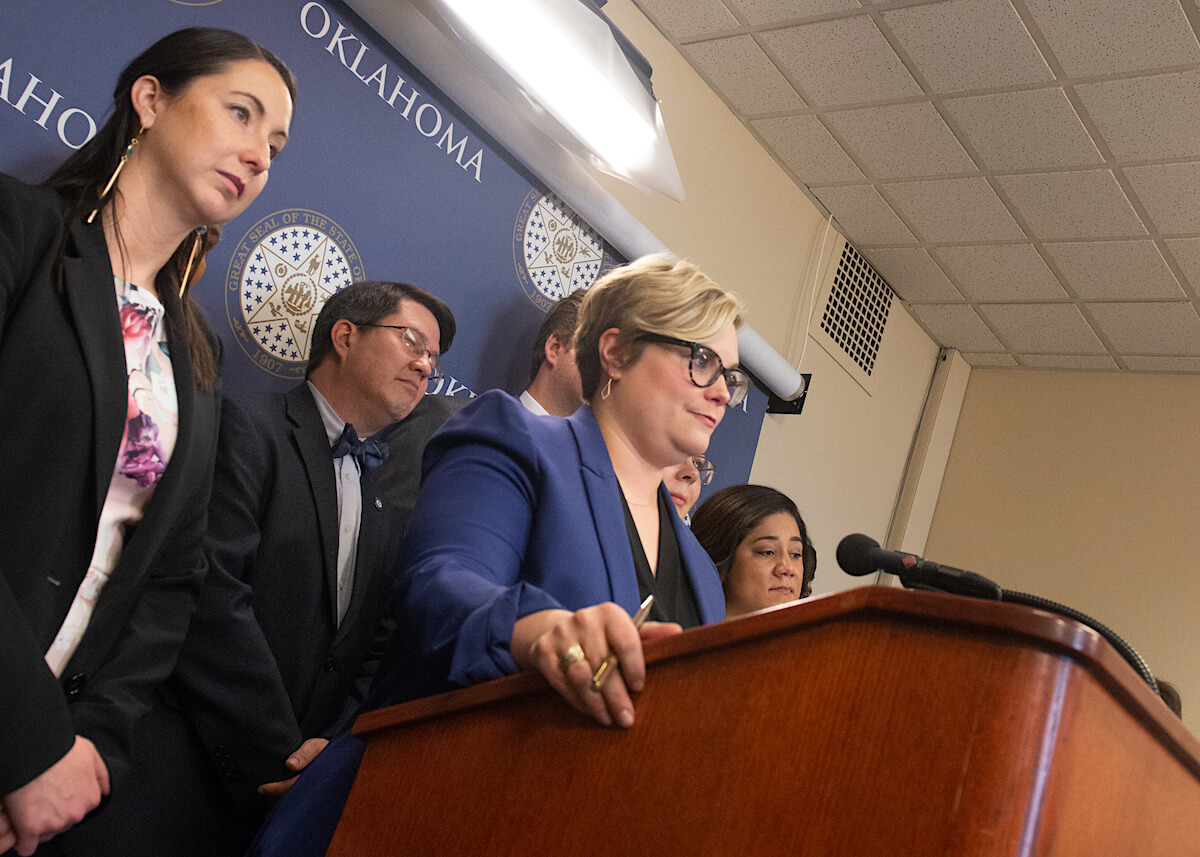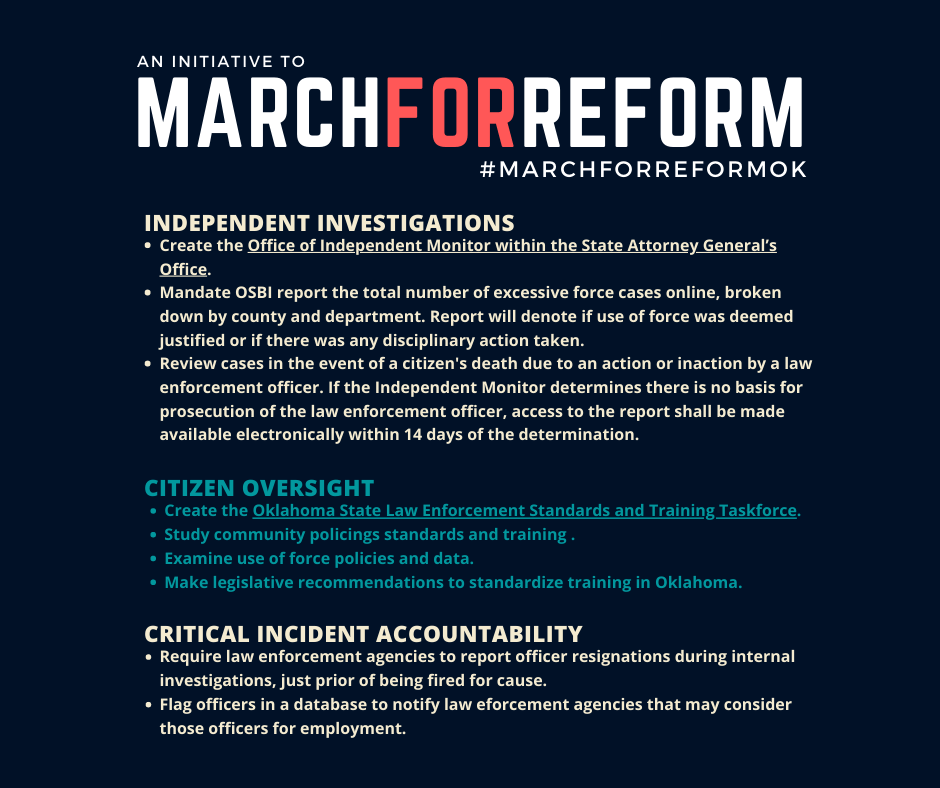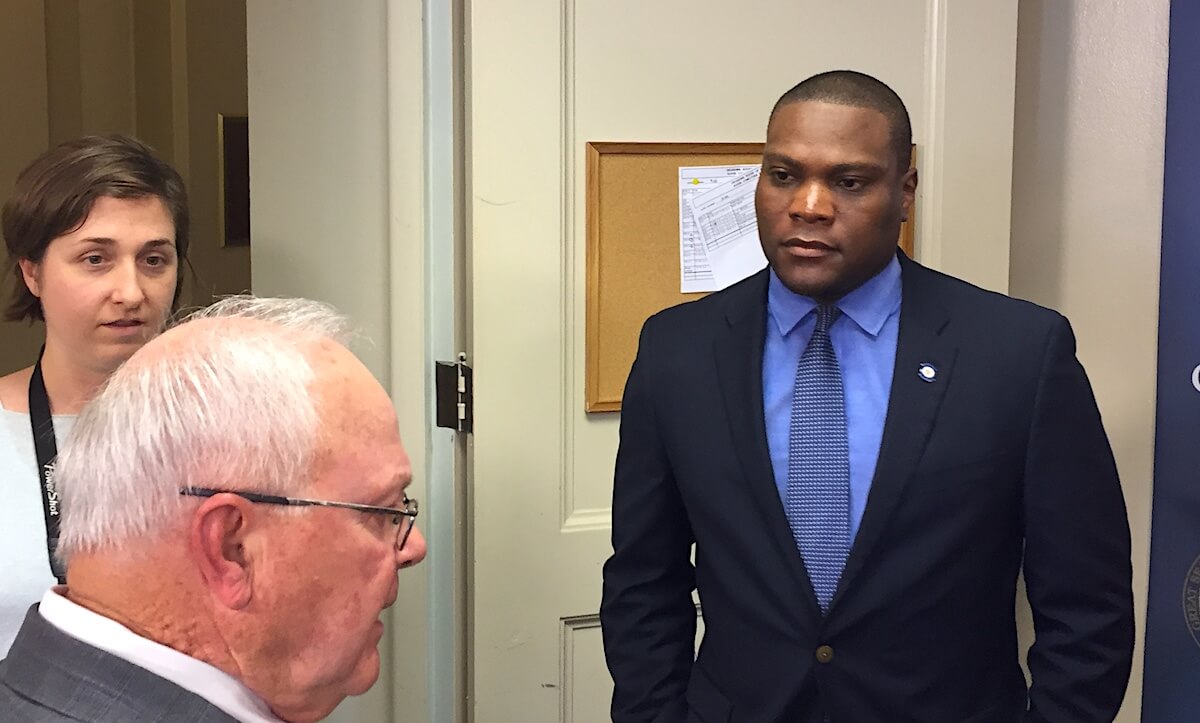
Three years ago, in the wake of Terence Crutcher’s controversial death at the gun of a Tulsa police officer, Rep. Monroe Nichols was frustrated he could not convince his Republican colleagues to hear a bill that would have established a state task force to review and recommend community policing standards in Oklahoma. This spring, he successfully advanced a similar bill through the House Public Safety Committee by a 9-4 vote, but that’s where its progress ended.
Now, after a wave of protests nationwide in response to the police-caused deaths of George Floyd, Breonna Taylor and others, Nichols is proposing the task force again, as well as a pair of stronger reforms: independent investigation of excessive force cases and an Oklahoma law enforcement database to alert departments if an applicant has previously resigned other employment during an internal investigation and prior to being fired for cause.
“We do have a system that is fundamentally flawed and desperately needs to change,” Nichols (D-Tulsa) said at a press conference this afternoon. “I’m currently working on a bipartisan interim study to take a closer look at these ideas and others.”
Nichols might understand the intersection of race and policing better than any other member of Oklahoma’s 149-person Legislature. A black man whose father was a Houston police officer and whose uncle is a Dallas police officer, Nichols is also the father of a 12-year-old boy. During Friday’s press conference, he paused deeply before telling reporters a story relayed to him by his son’s mother, who is caucasian and Cuban.
“Recently, on a trip back from Bartlesville, he was riding with his mother, and she made the comment — kind of jokingly — that she better slow down before she was pulled over,” Nichols recalled. “My 12-year-old — again, the grandson of a police officer and the son of a state representative — became very anxious at the idea that she might be pulled over. His mother asked him what was the big deal. She said the worst case scenario was she would get a ticket, and my 12-year-old said, ‘Well, mom, I look older than I am. What if they don’t believe that I’m your son?'”
Nichols said he had debated whether he would tell the story of his son’s concern, but ultimately decided to do so.
“Even he has lost a little bit of faith in how he might be judged in the eyes of a police officer,” Nichols said. “These reforms will hopefully restore faith in law enforcement, elevate the work of truly great officers and lead to safer communities across the state.”
Virgin: ‘We see this as a starting point’

House Minority Leader Emily Virgin (D-Norman) joined Nichols and Rep. Collin Walke (D-OKC) at Wednesday’s press conference. The leader of the House Democratic Caucus emphasized Nichols’ message that their “March for Reform” initiative is in its early stages, eight months ahead of the 2021 legislative session.
“We see this as a starting point, so we are going to be having some conversations, not just with this list but taking this and talking to the entire caucus in terms of what we want to see with police reforms and racial equity in the next session,” Virgin said.
She said mental health programs and funding should also be a key part of the discussion in Oklahoma.
“I think for far too long we have asked police officers to respond in every single situation when there might be something wrong in society,” Virgin said. “They’re not social workers, and we shouldn’t expect them to be. We have systematically divested from mental health services in Oklahoma.”
Nichols agreed, referencing his perspective as the family member of police officers. His uncle was on duty in Dallas when four police officers were shot and killed by a sniper in 2016 during a demonstration against fatal police shootings.
“My uncle was one of the officers that was working the protest. I say that to say that I understand the danger that police officers face. I think that danger is elevated when we have a system that doesn’t hold folks accountable,” Nichols said. “I really believe these reforms are reforms that could keep folks like my uncle as safe as they keep folks who look like me or who are just out in the community who might get pulled over. That’s one of the reasons I am so passionate about this. I think it goes both ways.”
Underscoring his passion, Nichols laid bare more of his family story, noting that his father died when he was 14 years old.
“He was younger than I am now. And a lot of it had to do with some of the trauma associated with being a police officer,” Nichols said. “I think there is an important mental health component to the officers themselves, and I hope departments really recognize that. So I hope another thing that comes out of this is that we recognize the humanity of police officers and make sure they are getting the kind of treatment they need, because they see a lot of things.”
Osburn: It’s time to ‘take a good, hard look at our hearts’
Nichols and his family have seen a lot of things that Rep. Mike Osburn (R-Edmond) knows he has not. But Nichols mentioned Osburn as a partner in the House interim study being sought on the topic of police training, oversight and accountability. Osburn called Nichols and asked if they could work on an interim study together.
RELATED
After Shelby verdict, Tulsa lawmakers call for improved training by Tres Savage
“I am open to hearing and talking about everything. I think it’s important for us to have open dialogue and full discussions on things,” Osburn said by phone after Nichols’ press conference. “I feel like Rep. Nichols and I are friends and that we can work together.”
Osburn said he recognizes that the Oklahoma Legislature is overwhelmingly white.
“You asked if it is up to white people to look and take action? The answer to that is absolutely,” Osburn said. “I think it’s time for all of us to take a good, hard look at our hearts. There are some real problems in our country that we have to pay attention to. And my hope is that working with Rep. Nichols, we can bring some of those issues to light and work on them in a bipartisan way.”
Nichols: TPD major’s comments an outrage
Among the racial justice and policing issues being discussed in Oklahoma over the past 48 hours are the comments made by Tulsa Police Department Maj. Travis Yates on the Pat Campbell Show’s podcast. Yates said systemic racism in policing “just doesn’t exist,” and he offered his interpretation of crime data.
“If a certain group is commiting more crimes — more violent crimes — and law enforcement’s having to come into contact with them, that number (of police shootings) is going to be higher. Who in the world in their right mind would think that our shootings should be right along the U.S. Census lines? That’s insanity,” Yates said. “All of the research says we’re shooting African-Americans about 24 percent less than we probably ought to be, based on the crimes being committed.”
Yates’ remark about who “ought to be” shot drew condemnation from the Tulsa Black Officers Coalition as well as Nichols.
“I don’t believe that any officer who not only feels that way but is bold enough to go on a radio station and publicly voice those attitudes will ever have the confidence of the public that is required to be a good law enforcement officer,” Nichols said. “I certainly have no confidence in his ability to do his job, and hopefully some corrective action will be taken.”
Referencing Utah Sen. Mitt Romney’s recent participation in a Black Lives Matter march, Nichols said he believes Osburn and others will support some combination of reforms come the 2021 legislative session.
“I think it’s clear the ground has shifted on these issues quite a bit,” Nichols said. “I think there is a lot of bipartisan support for these kinds of reforms. I think it’s largely because, whether you come at it from a law enforcement tilt — it gives the opportunity to show and elevate really great officers — and I think it’s about restoring faith in government. We have checks and balances in this building, and I think that’s exactly what we are talking about with these kinds of reforms.”
‘March for Reform’ outline of objectives























